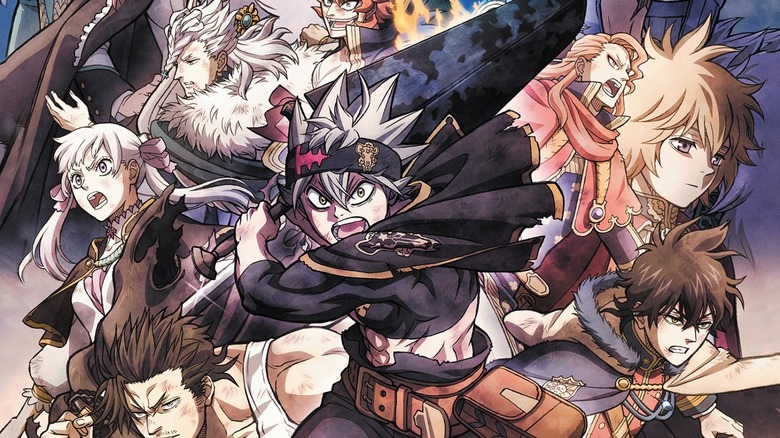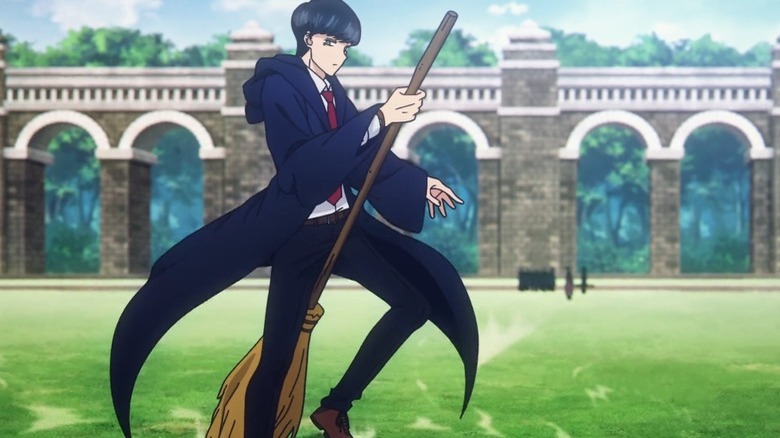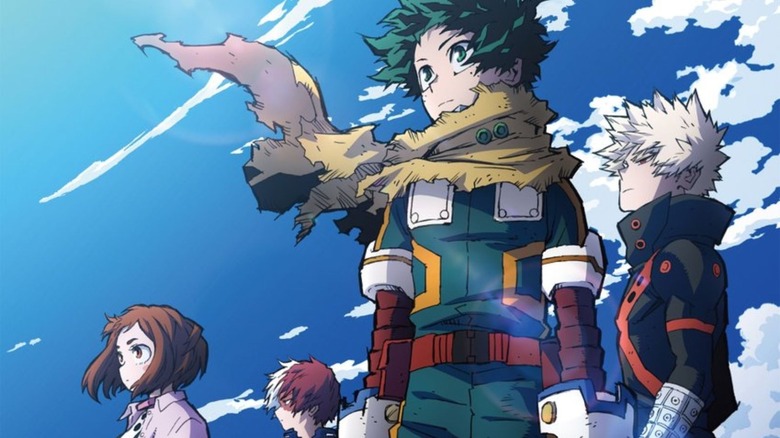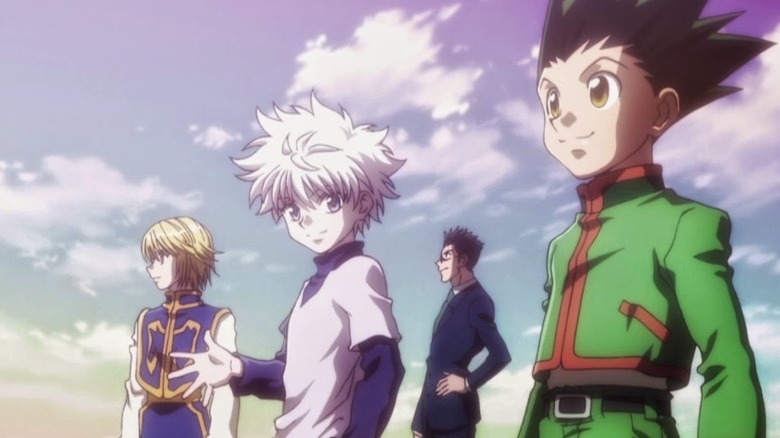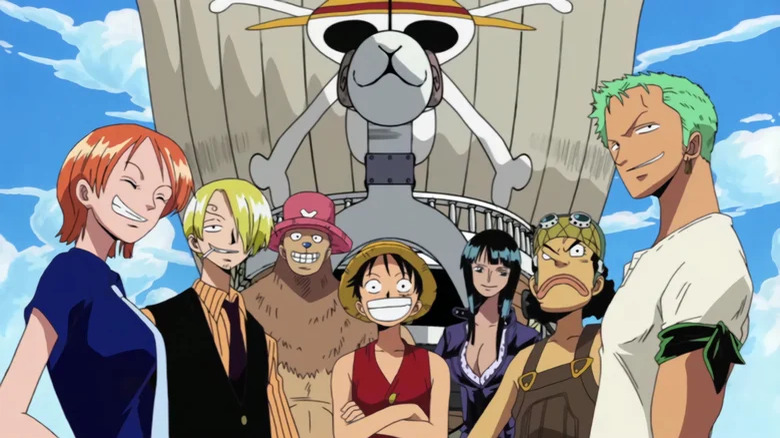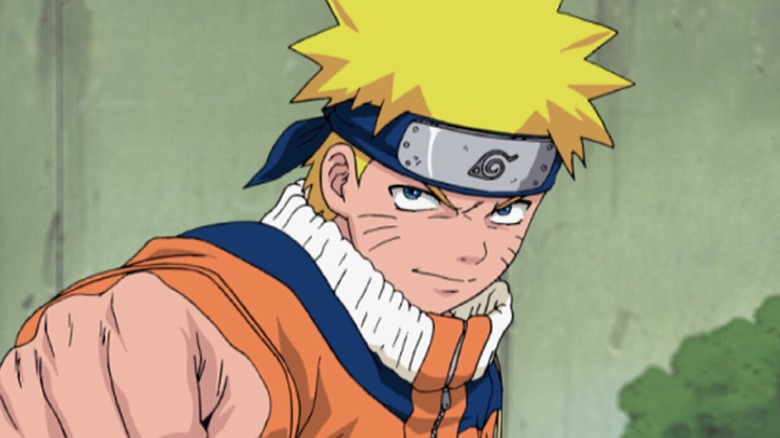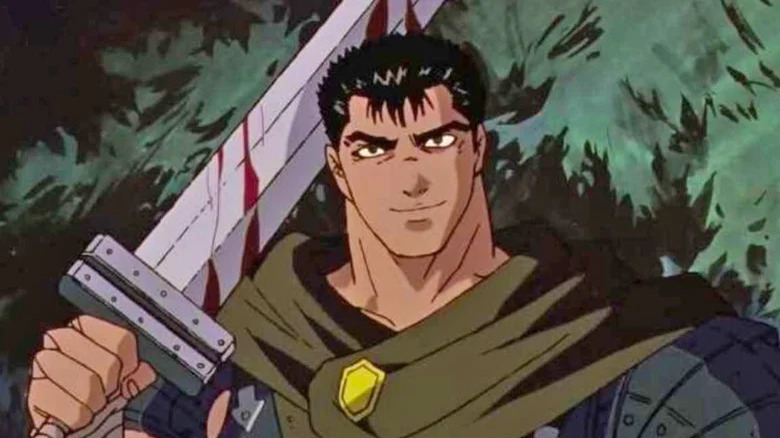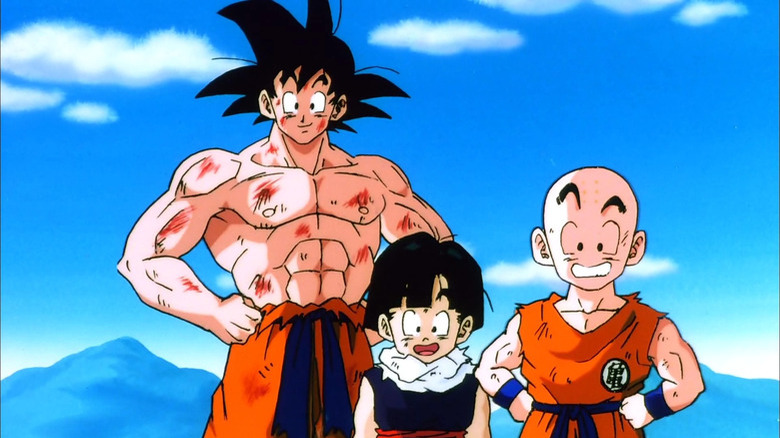7 Anime Shows To Watch After Black Clover
Anime is all but defined by the action shonen genre in the eyes of the general public. Much like the box office used to be dominated by superhero movies, the biggest anime tend to be action shonen shows about teenage boys awakening some big power and using the magic of friendship to overcome challenges. This can be a problem when reducing the medium to a single genre for newcomers. Still, after you watch a few shonen, you realize that the ones that stand out and become phenomena are those that take those formulas and tropes and make them their own.
One such anime is "Black Cover," studio Pierrot's adaptation of Yūki Tabata's manga of the same name. The story is set in a world where everyone can use magic, and we follow a boy named Asta who was born without magic — but instead with anti-magic abilities — who nevertheless wants to become the next Wizard King. The show became popular due to its fast pace, its darker world with a clearly defined class system, inventive power levels, and a focus on mentorship and loyalty in the face of inequality and discrimination.
The anime caught up to the manga and was ended in 2021, though it was then followed by the movie "Black Clover: Sword of the Wizard King" (which we called one of the best Netflix movies of last year), taking place in the six-month time jump in the story. After you're done with both, and while we wait for new episodes to eventually get made, you might be wondering what to watch next. Well, let this be your guide to the wonderful world of shonen anime.
Mashle: Magic and Muscles
The obvious answer for what you should watch immediately after "Black Clover" is, of course, "Mashle: Magic and Muscles." After all, this is another anime about a world full of magic users, and the one kid born without magic that can nevertheless surpass them all. What's more, "Mashle" is also a hilarious "Harry Potter" parody that makes any attempt at a remake moot.
Indeed, "Mashle: Magic and Muscles" is not at all coy about it being a parody of the Wizarding World and features multiple references to the franchise — from the four houses to the titles of each episode and scenes undeniably paralleling those from the "Harry Potter" books and movies. A big part of the comedy and plot involves Mashle being so incredibly strong his physical prowess appears to be magic to everyone else. That is how he tricks the entire school into thinking he's a broom-rider prodigy; he just throws his broom so strongly it appears to be flying, then stays floating in the air by moving his legs so hard he kicks the air down. Much like how "One Punch Man" got a lot fo mileage out of finding different ways of having its main hero hilariously defeat comically strong villains with a single punch, "Mashle" spends a lot of time showing Mashle punching jerk mages square in the face and deceiving them into thinking he used some advanced magic technique.
Much like "Black Clover," the comedy of "Mashle" also hides some poignant commentary. There's clearly discrimination against non-magic people in the world of "Mashle," with the show exploring how magic has led to complacency ... allowing Mashle to break down prejudices one punch at a time.
My Hero Academia
There's a reason "My Hero Academia" took the manga and anime world by storm when it first debuted a decade ago. It combines the action shonen formula with a clear love for American superhero comics, resulting in a show tailor-made for fans of superheroes and a cure for superhero fatigue. The story is set in a world where 80% of the population has a superpower (some useful, some just annoying) and follows Deku, a young kid born without powers who is chosen as the successor to Japan's number one professional hero after being accepted into a prestigious academy for would-be heroes.
A big part of the appeal of "My Hero Academia" is how it presents a world where superheroics can be a profession, and how the idea of a superhero is affected by having professionals take sponsorship deals and spend more time being celebrities than keeping the public safe. What happens when, after decades of peace, a proper villain comes along and challenges superhero society? For one, a lot of delightful drama, followed by some of the best action animation Studio Bones has produced. We already recommended "Black Clover" for those who enjoy "My Hero Academia," so why not bring this full circle?
Besides, after seven seasons, there's never been a better reason to catch up on the anime, which is entering its own "Avengers: Endgame" era with an all-out war between heroes and villains, the highest of stakes, and some fantastic worldbuilding.
Hunter x Hunter
"Hunter x Hunter" is unlike any other action shonen, though it does share many elements with them. Reportedly a source of inspiration for "Black Clover," this is an anime adventure like no other and a masterclass in handling different genres, to the point where every story arc feels like an entirely different show. The series follows Gon Freecss, a boy who discovers the deadbeat dad who abandoned him as a kid is a "Hunter," a licensed professional capable of tracking down treasures, rare beasts and all sorts of lawless individuals. Gon sets out on an epic journey to follow in his father's footsteps and become a Hunter himself, and along the way he faces supernatural forces, all sorts of monsters, and some of the best villains in all of anime.
Part of what makes "Hunter x Hunter" so special is its compelling and memorable ensemble of characters — where even the smallest character feels important and fleshed out. Each arc essentially changes its cast, making it so there's no true protagonist. Though Gon is our eyes in this world, he is never the center of the story and doesn't even meet half of the villains. Each arc is unique, memorable, and never overstays its welcome.
Granted, there's the matter of "Hunter x Hunter" the anime being an incomplete story, mostly because the manga has been extremely slow to publish due to author Yoshihiro Togashi's health. Still, he is slowly writing more issues, and the anime and manga remain extremely popular, so season 7 of "Hunter x Hunter" is just a matter of when rather than if. Plus, as it stands, the anime has a terrific ending that works perfectly as the end of Gon's story.
One Piece
"One Piece" is one of the most legendary anime ever made, and its reputation is absolutely deserved. Don't let the long episode count intimidate you .. because, after a while, you'll wish there was more. Created by Eiichiro Oda, "One Piece" follows Monkey D. Luffy, a teenage boy with dreams of becoming the King of the Pirates and sets out in search of the legendary treasure called One Piece. But, of course, that is just the start of an epic adventure full of perils, confrontations against the World Government, revolutions, and much more.
One thing that makes "One Piece" stand out is its unique look, from the distinct and memorable character designs (even giving each character a specific laugh) down to the look of the islands our main crew visits, none of which look alike. Oda is a big fan of the medium of animation, particularly old-school, and "One Piece" is filled with references to the medium, to the point where the pinnacle of power-ups is not just a guy becoming more muscular, but literally turning into a Looney Tune. This extends to the general tone of the show. As serious as "One Piece" can and does get, it never stops being genuinely silly and funny, particularly thanks to the wildcat that is Luffy.
More than any other action shonen, which tend to focus on developing the characters through fights rather than fleshing out the world, the star of "One Piece" is indeed its vast world. Indeed, the setting of this anime has more in common with Middle-earth than the "Dragon Ball" universe, with a detailed history and mythology. Like "Black Clover," there's powerful social commentary that follows the exciting action and silly gags, with the show touching on bigotry, censorship, and revolution along the way.
Naruto
Just like "Black Clover," Masashi Kishimoto was inspired by "Hunter x Hunter" when crafting the beloved "Naruto." There's a reason this is considered one of "The Big Three" — a term used to describe Shonen Jump magazine's three most popular series in the mid '00s — alongside "One Piece" and "Bleach." It's simply that good.
The story follows Naruto, a young boy with a demon trapped inside him (much like Asta in "Black Clover") who wishes to become a great ninja and the Hokage of his village. Fans of "Black Clover" will recognize a lot of familiar elements here, particularly in the personalities of both Asta and Naruto, but also in their stories of friendship, their rivalries (with Sasuke and Naruto's relationship serving as inspiration for "Creed III"), and their individual determination. There's also the fact that both anime are produced by the studio Poirrot, which gives "Naruto" some of the best fight scenes in any action shonen anime ever. Indeed, part of the reason the fights in "Naruto" are so good is that the animators were inspired by live-action cinema rather than animated shows, with Jackie Chan and Quentin Tarantino being huge influences on the series.
Berserk
You wouldn't immediately think of "Berserk" as being related to "Black Clover," but Tabata initially thought of "Black Clover" as the shonen equivelent of the late Kentaro Miura's "Berserk," and you can see the similarities in the way both stories handle rivalries and revenge. This is a legendary manga and anime; a dark fantasy tailor-made for fans of Sam Raimi — to the point where Miura was concerned he'd get sued due to the similarities between his story and "Evil Dead II." It's a tale set in a medieval world and focuses on Guts, a lone swordsman, and his relationship with Griffith, the former leader of a mercenary band. Once sworn brothers, Guts is now on a path of vengeance — with the 1997 adaptation (the best one by far) focusing on the tragedy of their friendship. "Berserk" is "Game of Thrones" by way of Clive Barker, and one of the darkest yet most emotionally resonant stories you'll find in anime.
It's easy to see how "Berserk" managed to become such an influential story, inspiring everything from "Attack on Titan" to "Dark Souls" and even "Black Clover" — and not just because of the image of a big guy with a giant sword and a quiet badass female warrior, but also in the show's explorations of fate and choice. Central to the success of "Berserk" is the relationship and rivalry between Guts and Griffith, which is reminiscent of the central rivalry of "Black Clover." It's also what makes "Berserk" the prequel "Star Wars" fans deserve.
Dragon Ball
Here it is, without a doubt the biggest, best-known, most popular and beloved anime series of all time — a show so iconic it has become synonymous with the entire medium of anime, in addition to being directly responsible for Toonami's continuous existence. Akira Toriyama's "Dragon Ball" can be intimidating due to how the franchise has expanded and grown in the nearly 40 (!!!) years since its debut. (You can check out our beginner-friendly guide to "Dragon Ball" right here.)
The archetypical action shonen, a story of a young boy obsessed with punching the ever-loving crap out of every breathing being, the story follows Goku as he goes from plucky boy to the most powerful being in the universe. I don't have to tell you some of the best fight scenes of all of anime are in "Dragon Ball" and its sequel "Dragon Ball Z," but its style was so influential that it even inspired a scene in Studio Ghibli's "Spirited Away." Part of what makes this franchise so special is Toriyama's eclectic source of influences, which range from Jackie Chan to "Journey to the West," "Star Wars," Bruce Lee movies, and even "Superman.
The impact and legacy of "Dragon Ball" are truly epic, with Akira Toriyama's passing being marked across the planet, inspiring everyone from government officials to brands, sports team, artists and fans to pay tribute to the creative maestro responsible for one of the best stories in fiction. Every single shonen anime protagonist with spiky hair owes their design to Toriyama and this story. 40 years later, it's a series that remains as exciting as it ever was.
